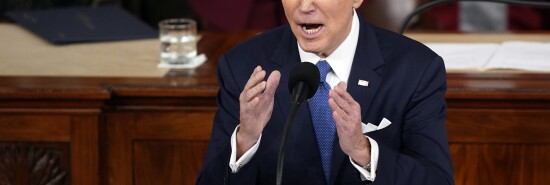
Why Biden flip-flopped on oil policy
Jon Miltimore
Video Embed
On his first day in office, President Joe Biden famously signed an executive order killing the Keystone XL pipeline, an oil pipeline system first commissioned in 2010 running from northwest Canada to the American heartland and Southern states.
Though the project would have had the capacity to deliver hundreds of thousands of barrels of crude to American refineries a day, Biden stated that the United States “must prioritize the development of a clean energy economy.”
BIDEN’S ALASKA OIL PROJECT APPROVAL IS A GIFT TO THE ENVIRONMENT
Rescinding the project’s permits was dubious from a policy perspective — transporting oil via rail is more expensive, more dangerous, and less environmentally friendly than by pipeline — but Biden’s order should have come as little surprise. During a 2020 presidential debate, Biden was asked if he would “close down the oil industry.”
“I would transition from the oil industry, yes,” Biden replied. “It has to be replaced by renewable energy over time.”
Apparently that’s ancient history.
This week, despite Biden’s pledge to prohibit new oil permits on federal land, he greenlighted a massive drilling program on federal land: ConocoPhillips’s Willow project. As the Associated Press reports, the project will tap reserves from “Alaska’s petroleum-rich North Slope, a major environmental decision … that drew quick condemnation as flying in the face of his pledges to slow climate change.”
The move, which drew a sharp rebuke from firebrand Rep. Alexandria Ocasio-Cortez (D-NY) and environmental activists, is a wise decision. Fossil fuels might have a bad reputation, but the reality is they supply 80% of the world’s energy needs. As global tensions heat up, it’s imperative that the U.S. have a robust supply of oil.
But how does the project mesh with Biden’s decision to scrap Keystone and “transition” America off fossil fuels? The answer is: It doesn’t.
Circumstances have changed since 2020. For starters, Biden is gearing up for another presidential run. The last thing he needs is a return of average gasoline prices to $4.17 a gallon, the highest in U.S. history. As Philip Bump noted in the Washington Post, during Biden’s term, there was an “unsubtle correlation” between gasoline prices and the mood of the country.
“As gas prices fell, American optimism rose,” Bump noted. “As prices rose, optimism fell.”
High gas prices are a headache Biden cannot afford in 2024.
This is a stark contrast to when Biden killed the Keystone pipeline. He’d just won the presidency and would not face reelection for four years, making it a ripe time to reward political supporters.
Furthermore, the public is not privy to all the machinations that took place behind the scenes to make the Willow project happen. Undoubtedly, a great deal of lobbying, deal-making, and personal capital was spent to incentivize officials to approve the project.
So while it may look like there’s no rhyme or reason to Biden’s energy policies, there’s a common theme between spiking Keystone and approving the Alaskan drilling project: align with his political interests. This conclusion is supported by a well-known economic theory.
In 1986, the economist James Buchanan received the Nobel Prize for his pioneering research on public choice. Despite its pedantic name, the idea is simple enough: People in government tend to reach decisions the same way everyone else does, by self-interest. (This is why Buchanan described public choice theory as “politics without romance.”)
Sometimes the self-interest of politicians will overlap with the public interest — as in the case of the ConocoPhillips project. Oftentimes it will not. (Think of recent COVID-19 policies.) What’s important to understand is that government officials are motivated primarily by personal interest, not some grand vision of the public good.
This does not mean politicians are any worse than regular people. It’s only to say they reach decisions like pretty much everyone else. It does, however, raise serious questions about the ability of public officials to pass wise, or even coherent, policies that serve the public interest.
If you doubt this, look no further than Biden.
CLICK HERE TO READ MORE FROM THE WASHINGTON EXAMINER
Jon Miltimore (@miltimore79) is the managing editor of the Foundation for Economic Education.
